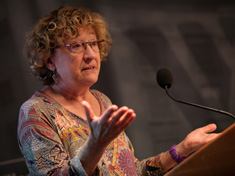-
Barbara Stilwell: Midwives Should be Empowered and Elevated, Not Subsumed by Process
May 1, 2015 By Linnea Bennett
One of the biggest challenges to improving health care in developing countries is that it’s not necessarily a great job. Midwives and other auxiliary health workers often face very difficult working conditions with little training, poor pay, and no hope of advancement. This can translate to poor results and even abuse of patients.
One of the biggest challenges to improving health care in developing countries is that it’s not necessarily a great job. Midwives and other auxiliary health workers often face very difficult working conditions with little training, poor pay, and no hope of advancement. This can translate to poor results and even abuse of patients.
Midwives need “a purpose that’s bigger than themselves,” says Barbara Stilwell, senior director of health workforce solutions at the NGO Intrahealth International, in this week’s podcast. “Self-actualization is a basic need for people,” she says, “but when we look at health care, one of the things we do is we task shift.”
Task shifting is a concept being explored in many low resource settings whereby certain treatments that previously only doctors were allowed to perform are delegated to auxiliary health workers. The idea is to make up for the lack of doctors by making each one go further. But in practice, this can be demeaning to health workers, Stilwell says. “We give you a task: you can give injections. But heaven forbid that you should ever know what the injections are for, or you should ever be able to tell me that I’ve told you something wrong, or you should ever bring an idea to me about that.”
“Self-actualization is a basic need for people”Instead of task shifting, Stilwell suggests giving greater purpose to health care jobs. “There is now some idea in my world…that we need to be coming up with big ideas that are going to change the way we look at these issues in a way that is much more profound than this.”
Autonomy and having independent success in one’s work has been shown to increase investment in health care jobs, says Stilwell. In Karnataka, India, Intrahealth International implemented a program where skilled nurses were trained to become mentors. “What we found was not only have the nurse midwives become much better at giving care, but they’ve also shown initiative,” she says. For example, some noticed broken radiant warmers – which are similar to infant incubators –and took steps to fix them on their own. Stilwell points out that taking this initiative not only showed independence, it also brought more value to the job itself.
Mastery brings two major benefits: it encourages people to deepen their skills and creates a ladder for those who want to pursue a career in health. Stilwell cites the 2014 State of the World’s Midwifery Report that projects 87 percent of all needed and essential care for mothers and newborns could be completed by midwives if they received the right education.
Ascribing health care to a larger purpose also gives providers more incentive and motivation to improve – especially when they see data that shows quality of care makes a difference in their patients’ lives. “There have been some fine examples about the midwives who are connected to communities and get feedback from the communities,” says Stilwell. “That’s their motivation.”
Barbara Stilwell spoke at the Wilson Center on March 31.
Friday Podcasts are also available for download on iTunes.
Sources: UNFPA.
Topics: community-based, Dot-Mom, Friday Podcasts, global health, India, maternal health, South Asia
 A Publication of the Stimson Center.
A Publication of the Stimson Center.




